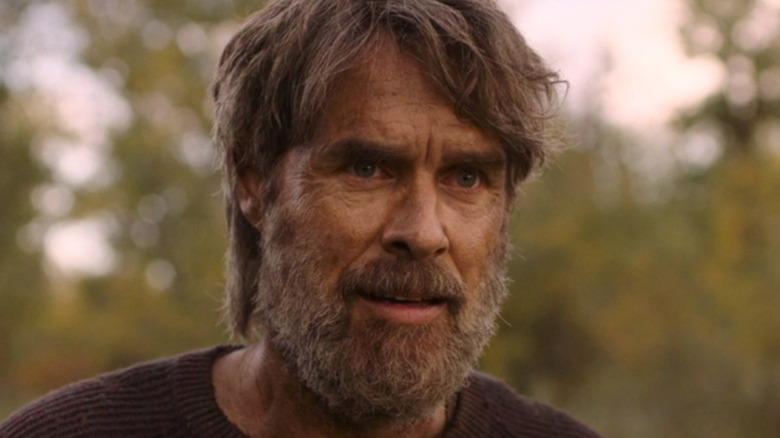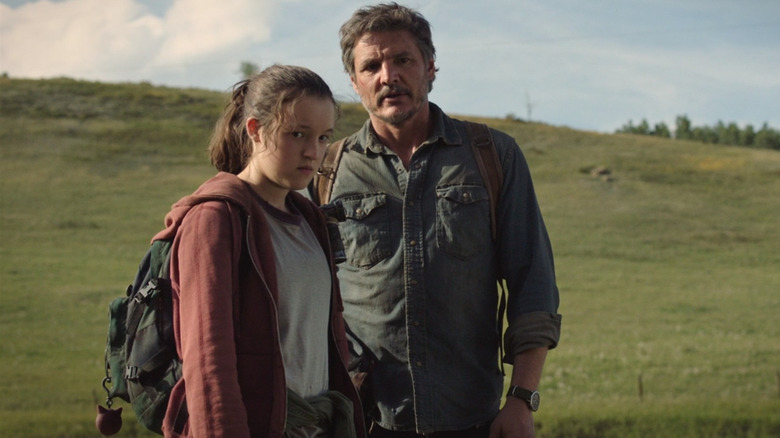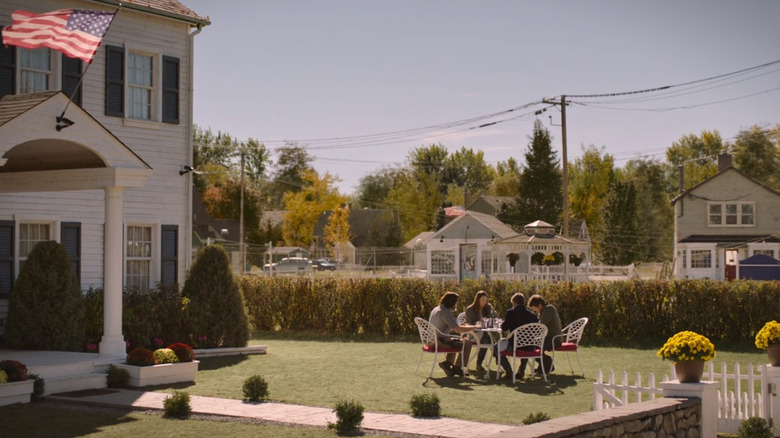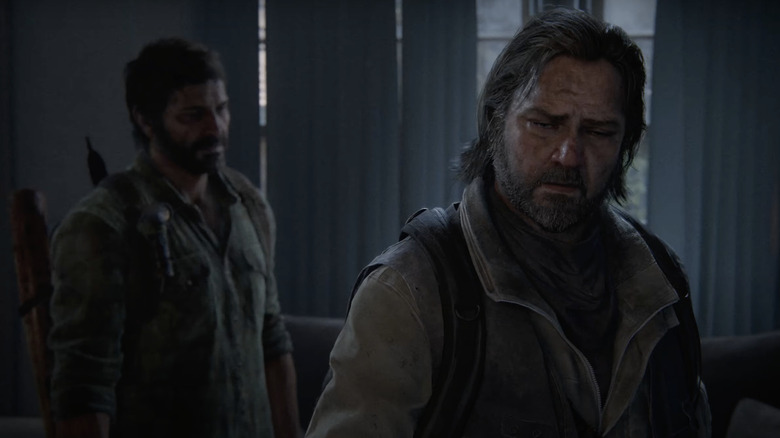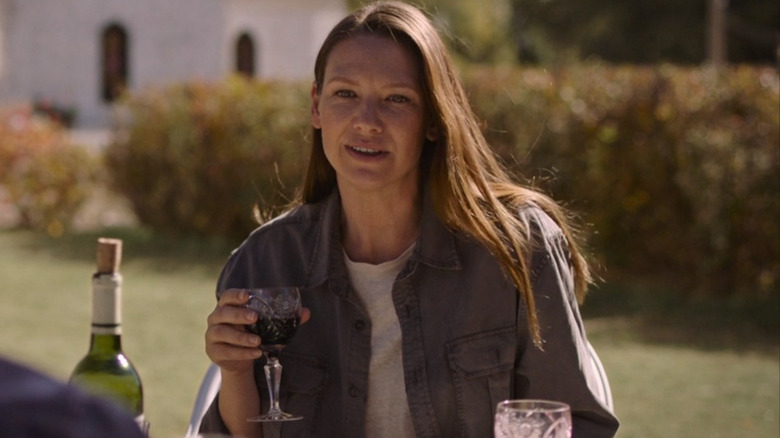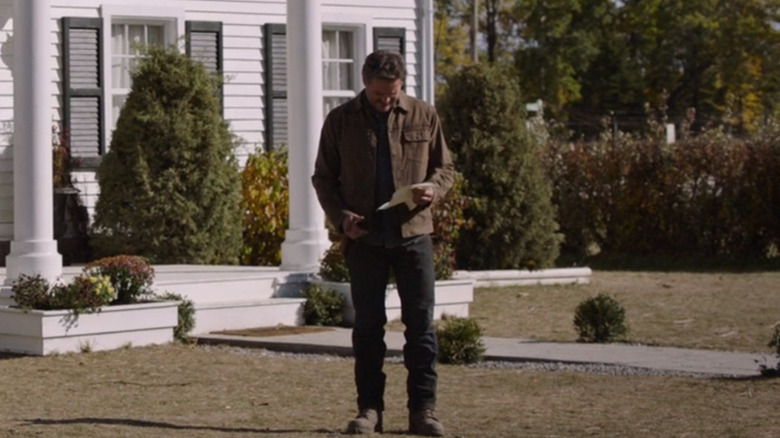The Last Of Us Episode 3 Is Beautiful, But Unforgivably Indulgent
Contains spoilers for "The Last of Us" Season 1, Episode 3
Though detour episodes usually don't directly progress the overarching narrative, often temporarily reduce the scope of the series, and may have even been originally conceptualized just to fill an episode order from the network, the best minds in television can often use them to great effect. These episodes can provide key details about a character's past, introduce new and important figures to the story, invest more time in supporting players, or simply give the audience a chance to breathe after a tense event in the story. They can be some of the best stories ever told through television — which is partly why this most recent installment of HBO's "The Last of Us" evokes a familiarly conflicting feeling that's pervaded the entire project.
Episode 3 features a huge diversion from both the canon of the source material and the overall plot of the television adaptation. "Long, Long Time" is by far the best episode yet. With a tight, engaging structure, subversive twists, and wonderful performances that show rare sides of Nick Offerman and Murray Bartlett, this episode surprisingly embodies that subtlety, emotion, and cohesion that made the original game a classic while departing from its story entirely.
As an installment in a series that already struggles from narrative bloat, however, it is bizarrely frustrating. Though the episode is fine in a vacuum, it doesn't accomplish anything that meaningfully supports the core narrative, transforming it into the two worst things a detour episode can become: indulgent and irrelevant.
Long, Long Time disrupts the story at a critical point
As optimistic and full of love as it is, an episode like "Long, Long Time" makes sense as a choice to follow last week's tragically catastrophic "Infected." In this way, it succeeds as a breather episode.
The final moments of last week's episode see the status quo of "The Last of Us" shift irreparably. With the original mission a wash and Tess (Anna Torv) dutifully stuffed into the fridge, Joel (Pedro Pascal) and Ellie (Bella Ramsey) are finally propelled into the meat of the narrative, left to their own combative devices to either persevere or give up entirely.
At this point in the story, the audience deserves the chance to focus exclusively on their relationship — especially since it will hopefully become (and really, should already be) the focal point of the drama. Up until now, their shared character development has been distracted by exposition and world-building. One of the many benefits of letting Joel and Ellie actually interact with Bill (Nick Offerman) in the game is that it gives them a chance to grow as a team.
For what it's worth, the writers seem to be aware that this chapter should evolve their relationship and try to do so in two sequences bookending Bill and Frank's (Murray Bartlett) story. Though they valiantly attempt to thread these disparate storylines together thematically, the plots are just too incongruous with one another to justify the placement of "Long, Long Time" — or even its existence.
It's the worst kind of flashback
It's a bold move to place the majority of an episode's events in the past. Because of the twist ending of "Long, Long Time" and Tess' fate at the end of Episode 2, the very brief scene featuring her and Joel is the only part of this flashback that could have any tangible impact on the future of "The Last of Us" as a series.
In this scene, we learn that Joel and Tess had a partnership with Bill and Frank and that Joel is similar to Bill psychologically. This in concert with Bill's letter weakly sells this episode as character development by proxy, but it feels hollow without seeing Joel make these emotional discoveries for himself through his own experiences. They're merely inferred through Bill's actions and seemingly transferred via a posthumous exchange between two people who were sort of friends for one scene.
Apart from this, "Long, Long Time" neither reveals nor establishes anything that feels satisfying or intriguing within the greater narrative of "The Last of Us" — in a series' freshman season, this is an unconscionable waste of screen time.
A detour from the detour: considering the original game
While many in the audience of HBO's adaptation have likely already played "The Last of Us," it's worth taking a moment to quickly recap Bill's presence in the original game — and to consider how changing his storyline also changes what Joel takes away from this chapter.
In the video game, Joel and Ellie actually do make it to Bill's while he's still alive — in fact, at the end of the first game, there's little reason to believe he's going to die on anyone's terms but his own. That's the beautiful thing about Bill: He takes the isolationist ideology brewing inside of Joel to its most logical conclusion. Yes, he survives quite comfortably, but he's also very much alone.
Though Bill boasts of his self-sufficiency with pride, the discovery of Frank's corpse cracks his facade. In the series, Bill's note is seemingly supposed to impress upon Joel a lesson he already learned from Tess: The best thing anyone can do in this world is save who they can. In the video game, however, as Joel watches this hardened survivalist struggle to hold back tears and dismiss his own grief, he learns that no matter how much he isolates himself, the pain of loss is inevitable. It's a rarer, more complicated lesson that has greater potential to weaken Joel's worldview.
Though glowing reviews rightly hail this as the best video game adaptation of all time, changes like this seem to devalue the quiet tragedy that made the original so haunting. It's a shame the series discarded this story beat, even in favor of an admittedly beautiful story.
The episode is haunted by the wrong ghosts
As a storyteller, becoming overinvested in ghosts is dangerous. Introducing a dead character in a forward-moving narrative without a clear and meaningful impact simply doesn't serve the story — this is especially true of Bill and Frank, who will presumably not appear in further installments of "The Last of Us."
This isn't to say it's necessarily a bad idea for the series to explore a dead character. An episode like "Long, Long Time" could work really well for "The Last of Us" while even improving upon one of the game's tropey-er moments — the writers just needed to focus on a different character. If they wanted to craft an entirely original narrative to provide levity and backstory, they should have explored Joel's relationship with Tess.
In addition to centering a character the audience already has some investment in (and giving her more to do than die for Joel's progression), a Tess-centric episode could actually inform Joel's relationship with Ellie. The series already wants to tie his love for Tess to his protection of Ellie in some way and even attempts to do so in this very episode. But with its focus on Bill and Frank instead of Tess (or perhaps even Sarah), it feels like the creative team is invested in the wrong ghosts.
Back to our regularly scheduled world-building
In attempting to rationalize "Long, Long Time" as a part of something bigger, it certainly provokes deeper thought about certain aspects of "The Last of Us." Perhaps this story could have been preserved as a reveal at a critical point later in the season, at a time when a mere letter from an old acquaintance could realistically change a Joel already afforded ample time to be influenced by Ellie's optimism. Perhaps the episode could have benefitted from intertwining past and present storylines. Perhaps Bill and Frank deserve an entire limited series dedicated to their survival.
What it doesn't provoke is anticipation for the future of "The Last of Us." There's no excitement to begin the next episode, no deeper or more profound understanding of this story, no love for any of the characters it will actually focus on. As Joel and Ellie come back into view, their mere presence puts into question the entire point of the previous hour.
Despite being a touching story exceptionally told — and possibly one of the best single episodes this year — it just seems like a poor use of time at this moment in the overall narrative. This becomes especially damning as soon as the next episode begins, wherein the plot would benefit greatly from Ellie being something more to Joel than an obligation. Then again, maybe we should be grateful that this one episode exemplifies everything there is to love about this world and the creative team behind it. For now, at least, that love abides.
